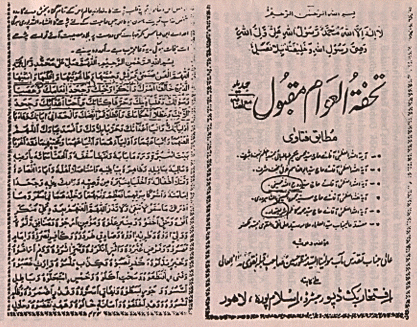|
Rotten Library > Religion > Fatwas
Fatwas A fatwa is simply an Islamic religious decree. Usually these pronouncements are innocuous -- for example, the fatwa regarding mechanically separated chicken -- but they have gained notoriety in recent years as a vehicle for militant Islamic fundamentalists to declare wars and death sentences on those who displease them.
A fatwa is simply an Islamic religious decree. Usually these pronouncements are innocuous -- for example, the fatwa regarding mechanically separated chicken -- but they have gained notoriety in recent years as a vehicle for militant Islamic fundamentalists to declare wars and death sentences on those who displease them.
The dynamics of controversial, high-profile fatwa issuance as it is practiced is fascinating. The targets of the decree in many cases have not even visited the country where it was issued. There is a near-inspiring volunteerism to it all: anyone who follows the teachings of that religion is authorized to carry it out. This last aspect makes it especially troubling for a hapless author like Salman Rushdie to get around, since anywhere he is, at any time, there might be a follower ready to get some easy points with the authorities of his religion. If the Pope told all Catholics to whack Larry Flynt in return for a place in heaven, how long do you think Flynt would be wheeling around? Osama bin Laden has issued fatwas on very thin religious basis. The American television show Who Wants to be a Millionaire, starring Regis Philbin, had a fatwa issued against it. In October 2002, an Iranian cleric declared that Jerry Falwell must die after he announced on 60 Minutes: "I think Mohammed was a terrorist." Mohsen Mojtahed Shabestari proclaimed: "The death of that man is a religious duty, but his case should not be tied to the Christian community." Shabestari is a spokesman for Ayatollah Ali Khamenei. The Turkish Daily News published an article in 1997 on best-selling "fatwa books" among Muslims, which spell out the rules for a variety of every day issues. The article is excerpted below:
To play backgammon is not right.The Prophet said: "The man who plays backgammon is as if he had painted his hands with pig's meat and blood." (Halil Gunenc, Fatwas on Contemporary Problems, Ilim Publishers, 1983.)
On the arts:
"On the day of Judgement, those who painted pictures will be asked to give life to their paintings. Angels keep away from the house in which there are paintings, Muhammad said. To paint the pictures of live beings is to imitate God's creativity. Only to paint pictures of trees and camel's packsaddles are allowed." (Halil Gunenc,Fatwas on Contemporary Problems, Ilim Publishers, 1983.)
On looking at young ladies:
"When a woman attracts the attention of your eyes, do not look at her a second time. The first look, is not a sin," said Muhammad. (Mehmet Paksoy, Special Fatwas on Family Life, Yeni Asya Publishers, 1996)
On erotic pictures:
Because the indecent pictures in newspapers and magazines, and the indecent scenes on television are not real but imaginary, looking at them is not comparable to looking at the real body of a woman. Therefore, it is not a sin to look at them. (Mehmet Paksoy, Special Fatwas on Family Life, Yeni Asya Publishers, 1996.)
On masturbation:
For Hanefi, Safi'i and Maliki sects, masturbation is a sin.For Safi'i and Maliki sects, though, wives' masturbation is not a sin, on the condition that she does it with her hand.For Hanbeli sect, if there is a fear of adultery and if it is done in order to avoid committing adultery, masturbation is allowed. (Dr. Faruk Beser, Special Fatwas for Women, Nun Publishers, 1996)
On man's sexual intercourse with another man:
The sexual intercourse of a man with another man is one of the heaviest of the sins. If this murderous act is spread in a country, that country will be subjected to God's wrath. The legal punishment of male homosexuality should be worse than adultery. (Mehmet Paksoy, Special Fatwas on Family Life, Yeni Asya Publishers, 1996.)
On the parts of body not to be seen:
The private parts of a man is between the belly and knees, and those of a woman are all parts of the body, apart from the hands, feet and face. It is illicit to uncover privates and look at these parts. However, a man can look at the chest, arms and thighs of his wife. Neither a man or a woman should look at his or her partner's sexual organ. (Dr. Faruk Beser, Special Fatwas for Women, 2 volumes, Nun Publishers, 1996)
On Jinns:
It is blasphemous to deny jinns' existence, since they are mentioned in Qu`ran. The Prophet Muhammad spoke to jinns. In pagan times, some perverts denied jinns' existence as their inheritors do in modern times.The denial of jinns' existence originates from the denial of the basis of Islam. (Halil Gunenc, Fatwas on Contemporary Problems, Ilim Publishers, 1983.)
|